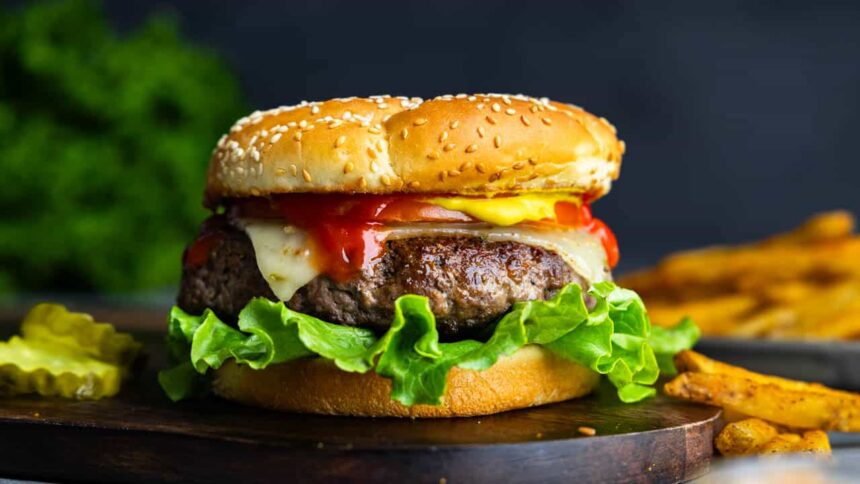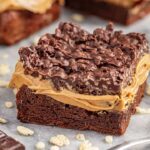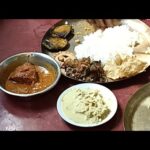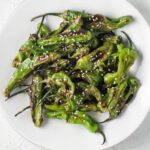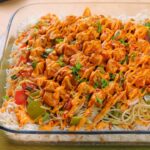Welcome to your ultimate guide to crafting the perfect burger! Let us provide you with all the tips and tricks you need to create mouthwatering, juicy burgers every time. From selecting the best ground beef and seasoning your patties to cooking methods and avoiding common mistakes, we’ve got you covered. Dive in and discover how to take your burger game to the next level!
For alternatives to beef burgers, check out our recipe for juicy turkey burgers that works for chicken too, or use our highly-reviewed black bean burger.
Beef Options
Choosing the right ground beef is crucial for a juicy, flavorful burger. Here’s what you need to know:
80/20 Ground Beef: This blend is 80% lean meat and 20% fat. It’s the gold standard for burgers because the higher fat content ensures a juicy, flavorful patty.
70/30 or 75/25 Ground Beef: These blends have even more fat, which can result in an even juicier burger, but they can also be greasier and may shrink more during cooking.
90/10 or 93/7 Ground Beef: These leaner options are healthier but can result in a drier burger. If you use lean beef, consider adding a tablespoon of olive oil or butter per pound to keep the patties moist.
Seasoning Your Meat
Seasoning a burger doesn’t have to be complicated. You can’t go wrong with simplicity. Here are the basic three:
- Salt and Pepper: The essentials. Use about 1 teaspoon of salt and 1/2 teaspoon of black pepper per pound of meat.
- Garlic Powder and Onion Powder: These add depth of flavor. Use about 1/2 teaspoon of each per pound of meat.
- Worcestershire Sauce: Adds umami and a little tang. Use about 1 tablespoon per pound of meat.
If you want to be more bold in flavor to switch things up there are always some interesting options when it comes to seasonings.
- Seasoning Mixes: Pre-made seasoning mixes can add a burst of flavor without much effort. Try fajita seasoning, dry ranch seasoning, or even cajun seasoning. Use about 1 tablespoon per pound of meat.
- Red Pepper Flakes or Cayenne Pepper: If you like a bit of heat, add 1/4 to 1/2 teaspoon of red pepper flakes or cayenne pepper per pound of meat. Adjust to taste based on your spice preference.
- Hot Sauce: A few dashes of your favorite hot sauce can add a nice kick. Use about 1 teaspoon per pound of meat, or more if you like it extra spicy.
- Herbs: Finely chopped fresh herbs like parsley, cilantro, or basil can add a fresh, vibrant flavor, or you can use dried herbs. Use about 2 tablespoons of fresh herbs per pound of meat or 1 teaspoon of dried.
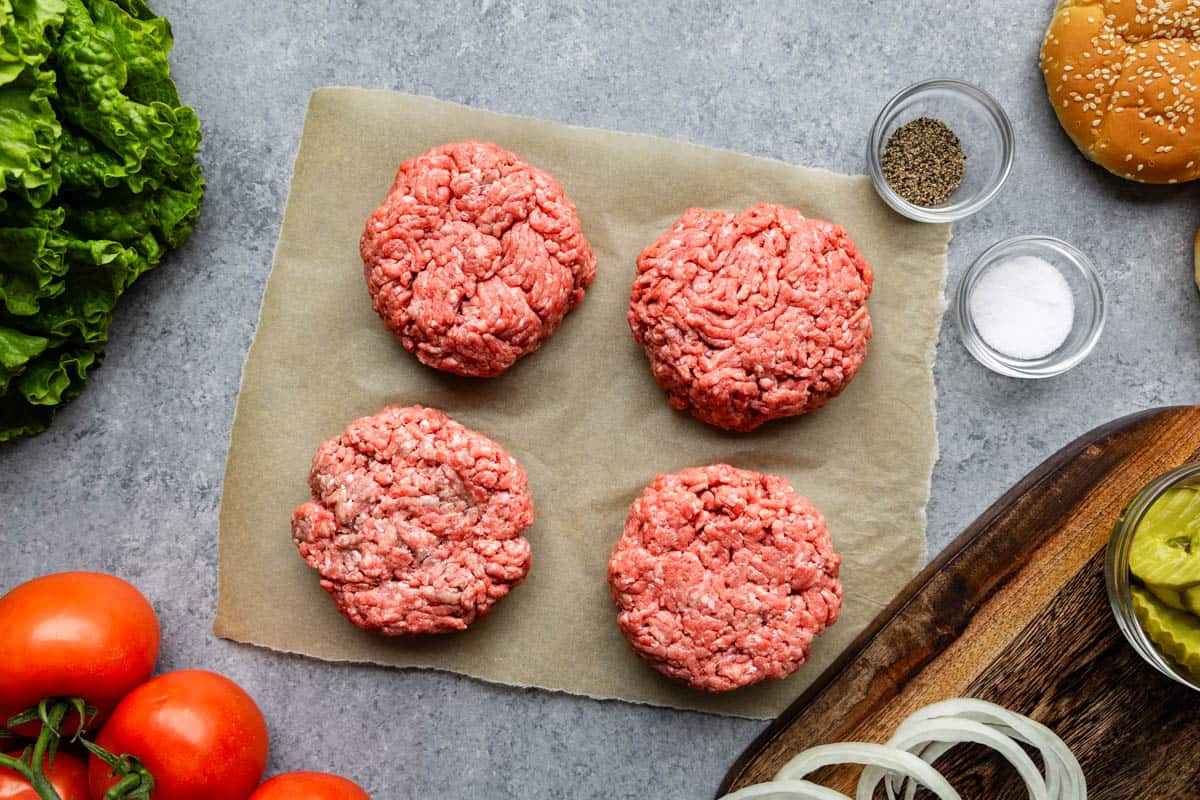
Additions To Mix In
Adding ingredients directly into the patty puts the flavor right there in the meat. You’ll notice most of these are popular toppings too. Putting them right there in the action keeps you from having to deal with topping sliding off. Here are some of the most popular options:
- Cheese: Add about 1/4 cup of shredded cheese per pound of meat. Cheddar, Monterey Jack, and blue cheese work well.
- Jalapenos: For a spicy kick, add 1-2 finely chopped jalapenos per pound of meat.
- Onions: Add 1/4 cup of finely chopped onions per pound of meat for extra flavor and moisture.
- Bacon: Add 1/4 cup of cooked, crumbled bacon per pound of meat for a smoky flavor.
- Egg: Adding one egg per pound of meat can help bind the patty, making it easier to handle and preventing it from falling apart.
Why and When to Add an Egg
Adding an egg to your burger mixture is helpful for binding the meat, especially if you’re using lean ground beef or adding a lot of mix-ins like cheese or vegetables. The egg helps keep the patty intact during cooking, making it less likely to fall apart.
Don’t Overwork Your Meat
Gently mix your ground beef with any seasonings or add-ins. Overworking the meat can result in a tough, dense burger. Handle the meat as little as possible to keep it tender.
Thickness
1/4-Inch Thick: Ideal for a quarter-pound (4 ounces) burger. These cook quickly and are perfect for a thinner, classic diner-style burger.
1/2-Inch Thick: Common for a third-pound (about 5.3 ounces) burger. These are a good balance between thickness and cooking time, resulting in a juicy burger with a nice sear.
1-Inch Thick: Great for a half-pound (8 ounces) burger. These take longer to cook but offer a hearty, juicy bite. Perfect for those who love a thick, meaty burger.
Patty vs. Bun: The Perfect Fit
Shrinkage happens! To ensure your burgers fit perfectly in your buns, aim to make your patties about 1/2 inch wider than the buns all around. This accounts for the inevitable shrinkage that happens during cooking, giving you a perfectly sized patty that fills the bun from edge to edge. A little extra width now means a perfect fit later!
Indent the Middle
Use your thumb to press a small indent into the center of each patty. This helps the burger cook evenly and prevents it from puffing up in the middle.
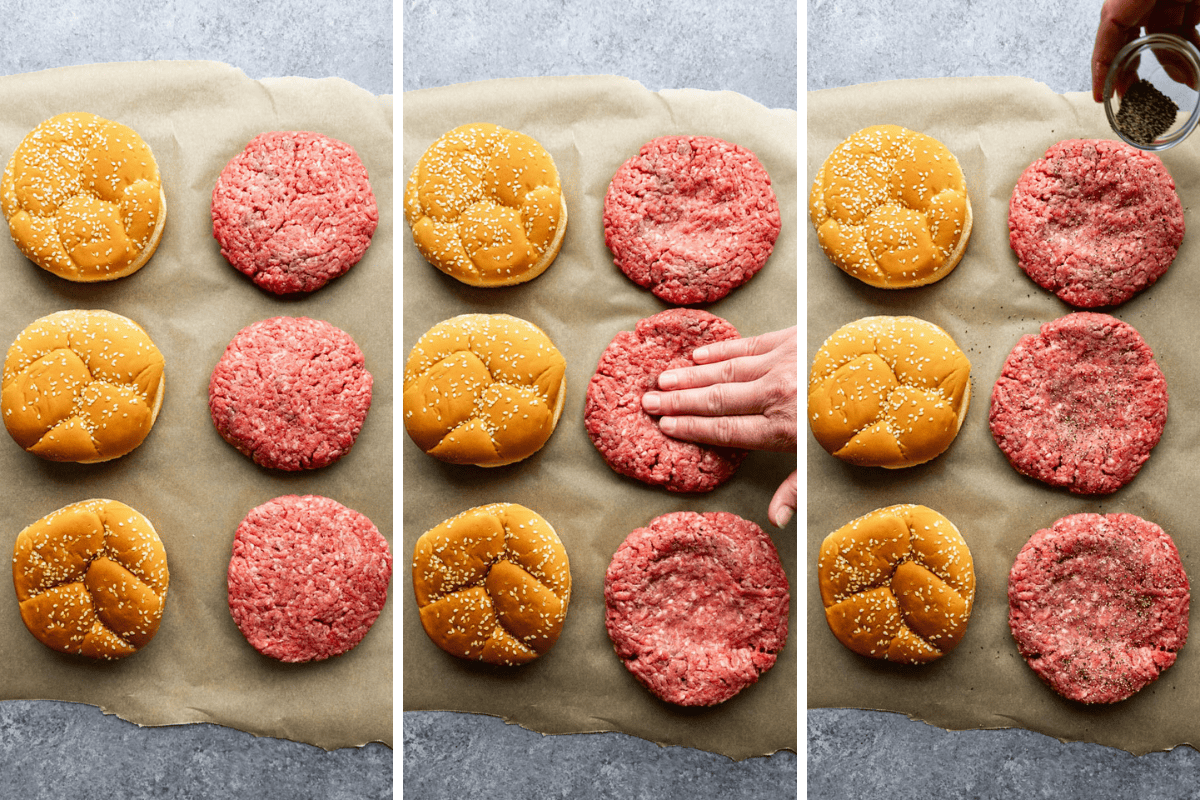
Cooking Options
Stovetop: This method gives you a nice sear and is convenient for indoor cooking, no matter the weather. A cast iron skillet is the optimal choice, but a heavy nonstick skillet is another great option. Heat a heavy skillet over medium-high heat. Cook the patties for about 4-5 minutes per side for medium doneness.
Grilling: Grilling imparts a smoky flavor and beautiful grill marks. The method is the same as a stovetop, it just has a different source of heat. Preheat your grill to medium-high heat. Cook the patties for about 4-5 minutes per side for medium doneness.
Smoking: Smoking adds a deep, rich flavor and a beautiful red color. Set your smoker to 225°F. Smoke the patties for about 60-90 minutes (depending on thickness) until they reach an internal temperature of 145°F for medium doneness. See our recipe for smoked burgers for more details.
Air Fryer: This method is quick and results in a juicy patty with a slightly crisp exterior. Preheat your air fryer to 375°F. Cook the patties for about 10-12 minutes, flipping halfway through. See our recipe for air fryer burgers for more details.
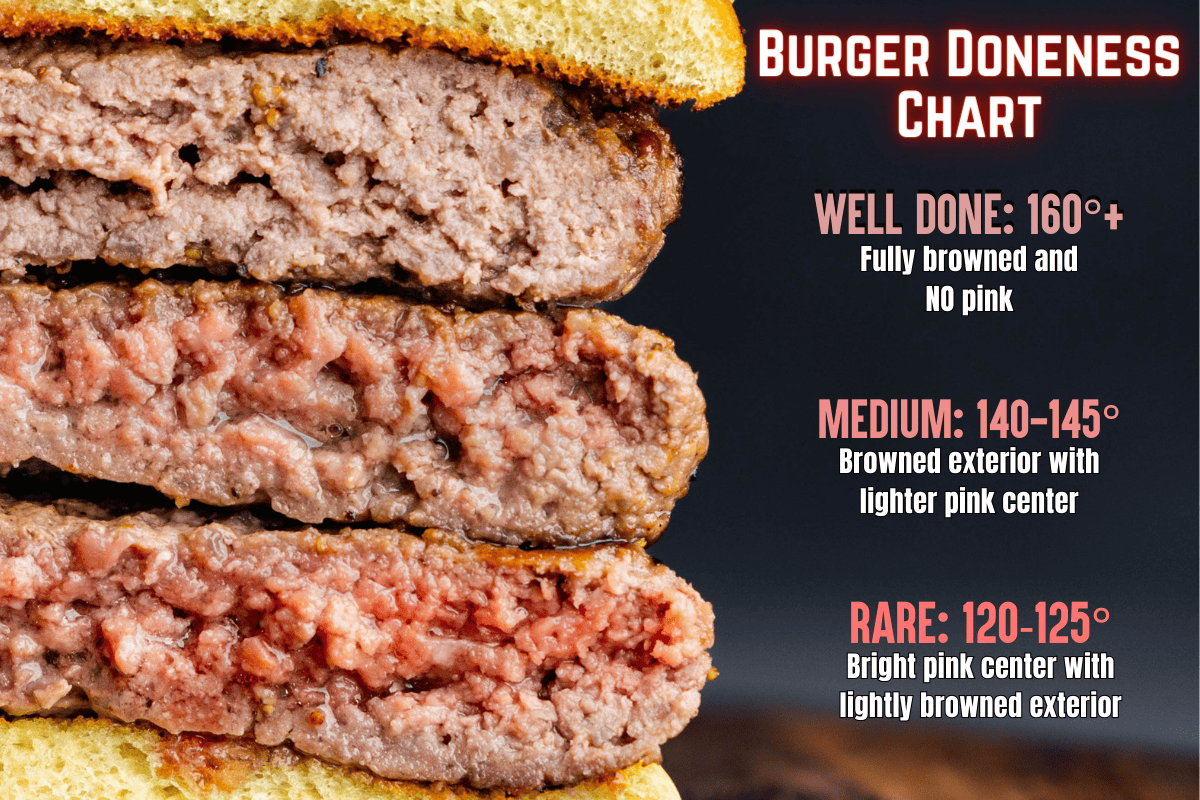
Internal Cooking Temperature
In the US, it’s safe to cook burgers to medium, but keep in mind that recommendations may vary in other locations. Consume ground beef under medium at your own risk.
Rare: Cook to an internal temperature of 120-125°F. The center will be cool and red. This usually takes about 2-3 minutes per side.
Medium Rare: Cook to an internal temperature of 130-135°F. The center will be warm and red. This usually takes about 3-4 minutes per side.
Medium: Cook to an internal temperature of 140-145°F. The center will be warm and pink. This usually takes about 4-5 minutes per side. For the best results, remove the burgers from the pan or grill when they reach 140°F and let them rest for 5 minutes. During this time, the temperature will rise to 145°F.
Medium Well: Cook to an internal temperature of 150-155°F. The center will have a slight pink hue. This usually takes about 5-6 minutes per side. Aim for an internal temperature of 150°F and let the burgers rest until they reach 155°F.
Well Done: Cook to an internal temperature of 160°F or higher. The burger will be fully cooked with no trace of pink. This usually takes about 6-8 minutes per side. Be aware that well-done burgers can be less juicy and a bit drier, but if that’s your preference, go for it!
Remember, using a meat thermometer is the best way to ensure your burgers reach the desired doneness without overcooking.
Bun Options
There are a lot of options out there when it comes to buns. Stick with one of the classic 5 options, or have some fun with Texas Toast, French bread, or go absolutely wild with our Mac and Cheese Buns. That’s right, a bun made out of fried mac and cheese. You’re welcome.
Brioche Buns: Soft, slightly sweet, and buttery. Perfect for gourmet burgers.
Potato Buns: Soft and slightly chewy with a mild flavor that complements any patty.
Sesame Seed Buns: Classic and versatile, with a slight crunch from the seeds.
Whole Wheat Buns: A healthier option with a hearty flavor.
Pretzel Buns: Dense and chewy, with a distinctive flavor that pairs well with robust burger toppings.
Toasting Buns
Toasting your buns adds a crunch and keeps them from getting soggy, Toasting is particularly beneficial to burgers with wet toppings, lots of cheese, or burgers with a high fat content.
Place the buns cut-side down in a skillet or on a hot grill for about 1-2 minutes until they’re golden brown. Watch them closely to avoid burning. You can brush them with oil or butter before placing them on the grill for an almost fried bread experience.
Common Mistakes
Overworking the Meat: Handling the ground beef too much can make the patty tough and dense. Mix the meat and seasonings gently and only until just combined.
Underseasoning: A bland burger is a sad burger. Make sure to season your meat well with salt, pepper, and any other desired spices or seasonings. Remember, a well-seasoned patty makes all the difference.
Not Preheating the Cooking Surface: Whether you’re using a grill, skillet, or air fryer, make sure it’s preheated before you start cooking. This helps to sear the outside of the patty and locks in the juices, resulting in even cooking.
Pressing Down on Patties While They’re Cooking: It might be tempting to press down on your burgers with a spatula, but doing so squeezes out the juices, leading to a dry burger. Let the patties cook undisturbed as much as possible to retain their moisture and flavor.


